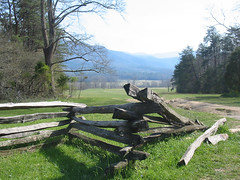| (Photo credit: vjack) |
Following up on my post about the importance of atheists articulating what we do believe, it is time for another addition. I believe in the natural world and use the word "reality" to refer to the natural world. That is, I believe that the natural world exists and that it is all that exists. Thus, I am a materialist in the philosophical sense (i.e., I reject all notions of a supernatural realm). Far from being the nihilism with which atheists are frequently accused, this is an awe-inspiring worldview.
Many atheists probably share my belief that the natural world is all that exists, however it is not synonymous with atheism. One can be an atheist and still believe in ghosts, monsters, demons, etc. However, I do not. I believe that ghosts, angels, demons, etc. are fictional constructs which do not exist in the real (i.e., natural) world.
Truth is not a democratic construct, so the fact that the majority of people believe in something like angels has no bearing on whether angels actually exist. Truth is not based on wish fulfillment so the fact that millions of people desperately want there to be angels does not mean that there are. Truth is not subjective in the sense that it would be absurd to claim that angels exist for some people but not for others. They either exist or they do not; they do not.
The Existence of Supernatural Entities
How do we know that supernatural entities, forces, etc. do not exist? First of all, it is worth noting that there is no evidence to support the existence of supernatural beings. At the same time we are learning about the natural world, there is no unambiguous evidence of anything supernatural. Does this mean that supernatural beings cannot exist? No, but it makes their existence highly improbable and the belief in their existence clearly irrational.
Many atheists are content to stop with the question of evidence and the lack thereof. Others suggest that we can go beyond the question of evidence and arrive at the position we just temporarily discarded - that supernatural entities cannotexist.
Borrowing once again from Atheism: The Case Against God, we must understand that to say that something is supernatural is to tell us what it is not (i.e., of nature) but not what it is. But more importantly, identifying something as supernatural places it forever outside the scope of human comprehension. A supernatural entity can possess no properties or defining characteristics because such characteristics or properties are inherently restrictive with reference to the natural world. To introduce supernatural concepts is to refer to the unknowable (i.e., a being without any nature or defining characteristics). This brings us right back to the problems inherent in positing an unknowable god. A truly unknowable being cannot be believed in because one would not even know what one was believing in!
In Awe of Nature
To summarize the journey so far, I started with atheism, criticized the god concept itself as fundamentally incoherent and lacking a shred of supportive evidence, and now equate reality with the natural world, rejecting anything supernatural. This brings me to something much broader than atheism but something which many people continue to confuse with atheism. It also brings me to what many theists perceive as being void of meaning.
I've never understood this perspective. Not a day goes by where I don't experience my surroundings with a sense of awe. Perhaps it is a beautiful sunset, a colorful bird at one of my many feeders, an interesting cloud formation, or one of the many forms of human beauty with which I am surrounded. The fact that I can understand what I am seeing does not diminish the awe and appreciation with which I experience it. In fact, I am convinced that it enhances my experience.
The common religious claim that atheists are missing an important part of human existence and lead empty lives as a result is beyond absurd. I am passionate about learning everything I can about the fascinating world in which I find myself. Every step toward understanding fuels my excitement and deepens my sense of connection to the larger whole of nature. I have no need or desire to worship gods, man, nature, or anything else for that matter. I am clear-headed enough not to confuse what I experience with some form of spirituality for I derive no benefit from positing superfluous constructs to explain my experience.
